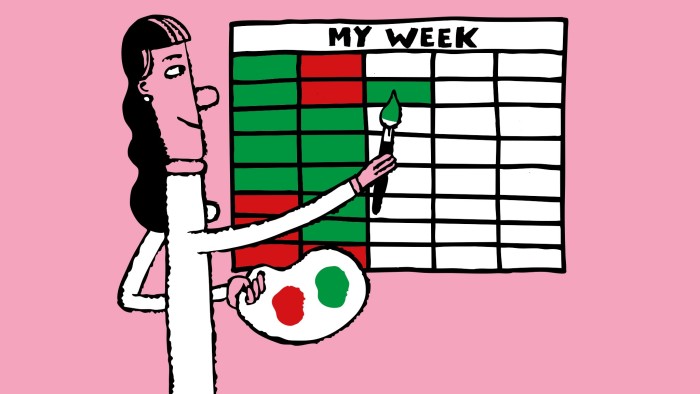Unlock the Editor’s Digest for free
Roula Khalaf, Editor of the FT, selects her favourite stories in this weekly newsletter.
A few weeks ago, the 29-year-old boss of a small tech start-up in Wales went on LinkedIn to say he was going to try a new way of working.
“We’re abandoning the four-day work week,” said Aled Nelmes, whose staff had just spent two years working roughly 32 hours a week from Monday to Thursday, with no cut in pay from their previous five-day week.
This had boosted output and staff retention, he said. So he was going to go a step further with a three-month trial of a completely flexible 32-hour week. Employees could work any time on any day from Monday to Sunday, anywhere they liked.
The idea was to make Lumen SEO, the Cardiff search engine optimisation company he founded in 2020, as attractive as possible to parents, new joiners and its existing seven staff.
The response to his post, it is fair to say, was large.
Nearly 1,000 people commented on an idea that many said sounded “epic”, “brilliant” and “stunning”. Several asked if Nelmes was hiring. (He plans to). And some asked the question that first came to my mind: how on earth can something like this work? How do people know who is working when? Do staff feel compelled to be contactable 24/7? How does the business stay responsive to its clients’ needs?
Nelmes admits the effort takes discipline. He uses a software platform to delegate tasks to staff each Monday, depending on how many hours each job is expected to take. A messaging tool lets everyone know whether people are available or not. A lot of preparation is done for meetings, to avoid wasting time.
Everyone has to work at the same time for at least two or three hours a week but Nelmes thinks that in general, the corporate working world is too industrialised for a digital age. So it pays to let people shape their working hours as much as possible.
“I would argue that, because staff members have more time outside of focused, regimented, structured work, they tend to come into the office with more ideas,” he says.
So far, Lumen seems to be an outlier.
The UK’s 4 Day Week Foundation has been encouraging a 32-hour, four-day week for years but its campaign director, Joe Ryle, says most firms adopting the idea work four weekdays.
A minority of organisations have tried 32 hours over five weekdays, he said. But he didn’t know of any trying Lumen’s full-fat version of 32 hours over seven days.
I can see why some might try, if they are in a white collar sector and have a business like Lumen, whose staff do a lot of work individually, on tasks such as writing material for company websites.
They would also need a boss like Nelmes, who likes to travel and winters on the Canary Islands for weeks at a time. (“You meet lots of interesting people and it’s just healthier.”) And I’m sure it would help if a business was small.
Still, Lumen’s trial fits with the pandemic-fuelled shift to more flexible working, which has persisted at a greater scale for longer than many expected, including me.
The conventional four-day week itself has proven more tenacious than critics had predicted, though perhaps not as successful as some campaigners hoped.
The Indeed job site says the share of postings mentioning a four-day week has risen noticeably since 2020 in the US, Germany, France, Canada and the UK. But it’s still below 1 per cent, even in the UK which has the largest share of the five nations.
In 2022, Belgium gave workers the right to ask for a four-day week but only by condensing existing hours, not cutting them. Other regions have trialled the idea, as have many companies.
Of the 61 organisations that took part in a big six-month UK trial in 2022, 56 decided to continue with the model, says the 4 Day Week Foundation, which has now accredited more than 230 four-day organisations. Most have 10 to 50 employees. The largest is Atom, the app-based bank, which has around 470 staff. A lot are in sectors such as tech and marketing. But a number are doubtless run by bosses like Nelmes who are convinced this is the way of the future and are, crucially, young. Their ideas might stick around for a lot longer than you think.
